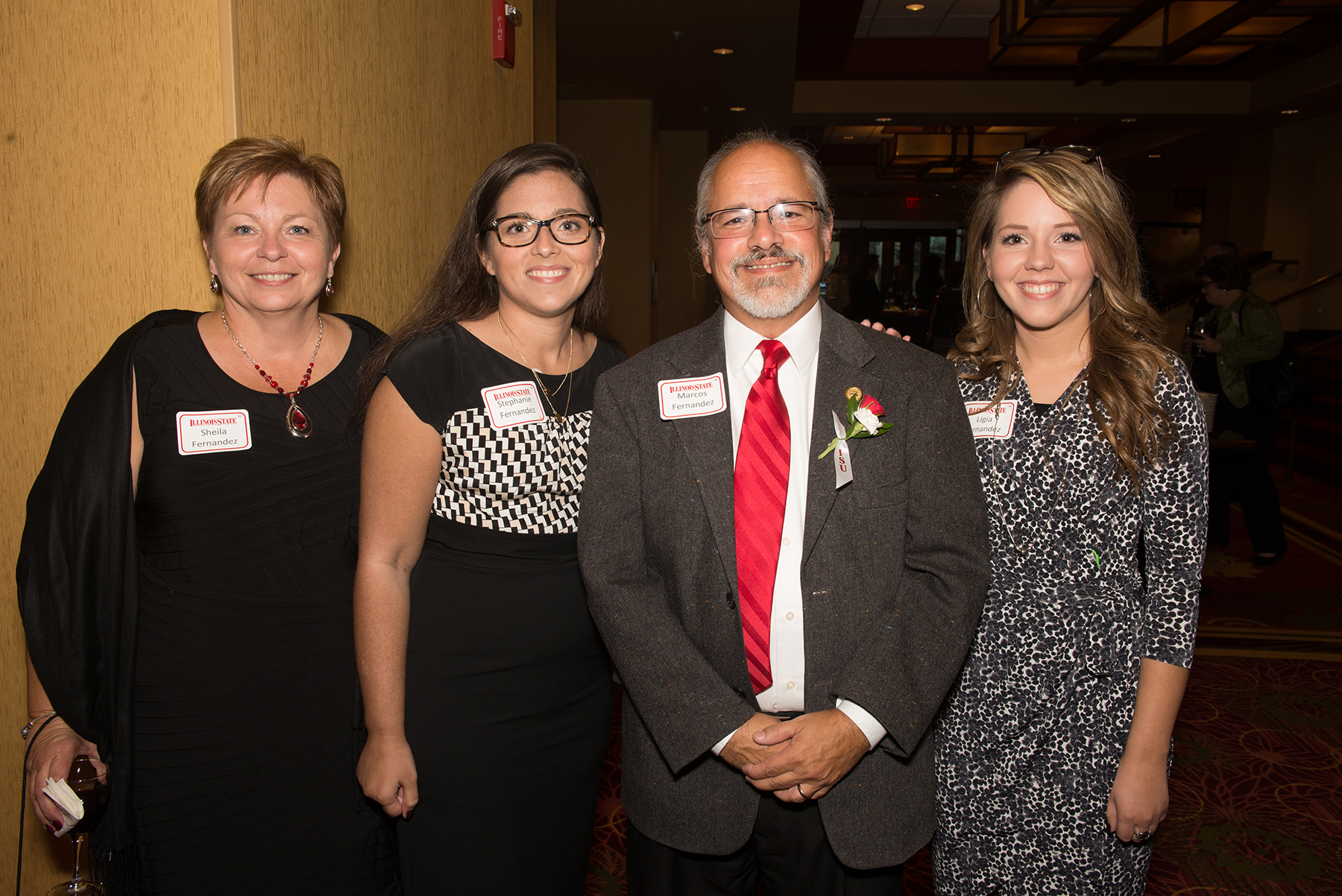When Marcos Fernandez ’80 and his family left Cuba in 1963, they did so looking for opportunities that couldn’t be found under the Communist regime of the island nation.
The opportunity they most valued was education.
In the United States, Fernandez’s mother and stepfather took on physically demanding factory work with a goal of providing better options for the next generation.
“They would tell me, ‘Marcos, education is the key,’” Fernandez reflected. “‘You have to gain an education and you will gain respect.'”

Marcos Fernandez speaks at the College of Applied Science and Technology Hall of Fame induction in 2015.
When young Marcos absorbed that advice he probably never thought he’d be getting that education on a dairy farm.
In the mid-1970s, as a Proviso East High School student, Fernandez made a downstate visit to Illinois State University and found something unexpected.
“I was interested in science and feeding the world; helping with poverty issues and social justice issues,” Fernandez recalls. “All of that combined eventually led me to agriculture, and Illinois State.”
His passion for both education and agriculture was kindled at Illinois State. That enthusiasm turned into a lifelong career that has had no shortage of academic accomplishments.
Fernandez is now an associate dean and director of academic programs at Purdue University’s College of Agriculture. After gaining his B.S. at Illinois State in 1980, Fernandez went on to gain a Ph.D. in animal science at North Carolina State and has conducted an impressive amount of research. In October of this year he was inducted into Illinois State’s College of Applied Science and Technology Hall of Fame.
Family flees Cuba
As exiles, the Fernandez family took a “Freedom Flight” out of Cuba to Miami. They were among the estimated 300,000 Cubans who didn’t see eye-to-eye with the Castro regime and fled the country during the decade of tumult following the 1959 revolution.
“It would have been unsafe certainly for my dad and my older siblings, and, as I grew up, for me. So that’s how we came to the U.S.—seeking political freedom,” Fernandez said. He was just 5 years old when the family fled Cuba.
Eventually the family made their way to the Chicago area. As a student at Proviso East in Maywood, Fernandez wasn’t a standout.
“I wasn’t even supposed to graduate from high school,” he said. It was a fact he was unaware of at the time, but discovered later when he found a note in his academic records. That blissful ignorance was most likely a good thing. Even though he was drawn to agriculture, Fernandez had more interest than confidence.
Fernandez hadn’t exactly grown up on the farm. Situated in a decidedly suburban location between Melrose Park and River Forest, Maywood wasn’t a place where Fernandez could get up close and personal with cows or goats.
“I had zero experience with large or livestock animals before I joined ISU,” Fernandez said.

Fernandez with Rob Rhykerd, chair of the Department of Agriculture, at the Hall of Fame induction in 2015.
But some encouragement from the faculty led him to operate out of his comfort zone. His mother had her doubts that livestock science was the best direction for his college education. It’s doubtful she envisioned her son earning his college degree while feeding goats and tending to milk cows. But something had clicked for Fernandez. It “felt right” and he knew the Department of Agriculture was for him.
“I stuck to my guns,” he said. “It felt like agriculture was what I was supposed to do, even though I’d never been around those animals. ISU provided the perfect environment. Their focus is on teaching and it was on developing me as a student.”
From his sophomore to senior years at Illinois State, Fernandez worked in the lab of Agriculture Professor Emeritus Clarence Moore, and on the University Farm.
Moore’s guidance had a big impact on Fernandez.
“I always felt he cared so much about his students—not just me—that he was earnestly interested in training, developing, equipping the rest of us,” Fernandez said.
Clarence Moore recalls that Fernandez was a motivated student and a hard worker, who was “not afraid to get his hands dirty” on the farm. He was so motivated that, according to Moore, Fernandez would hike a fair distance from his room at Wilkins Hall to get his additional time in at the dairy facilities. The University Farm was located much closer to campus than it is now, but it was still a few miles away, situated in a section of northwest Normal that was edged with corn fields.
“I wasn’t even supposed to graduate from high school.”
On the University Farm, the Cuban-born student with aspirations of feeding the world learned how to conduct the science that would make livestock healthier and increase production.
“I had him work on an experiment with me,” Moore said. “He got a chance to perhaps do a little bit more lab work.”
With a career that has included over 150 research articles and projects that have garnered over $2 million in funding, the lessons Fernandez learned in the animal science lab have gone a long way.
Fernandez has a taken the inspiration of his undergraduate experience at Illinois State into his current role directing academic programs at Purdue.
“I tell students, when you look back and you think of those teachers, those faculty, that you remember as having an impact on your life, those are the ones who felt that they were called to teach,” Fernandez said. “It was less of a choice, more of a calling.”
Steve Fast ’94 is a Department of English graduate who now works for the University of Illinois Press. He also hosts The Steve Fast Show on WJBC AM-FM. He lives in Bloomington.

